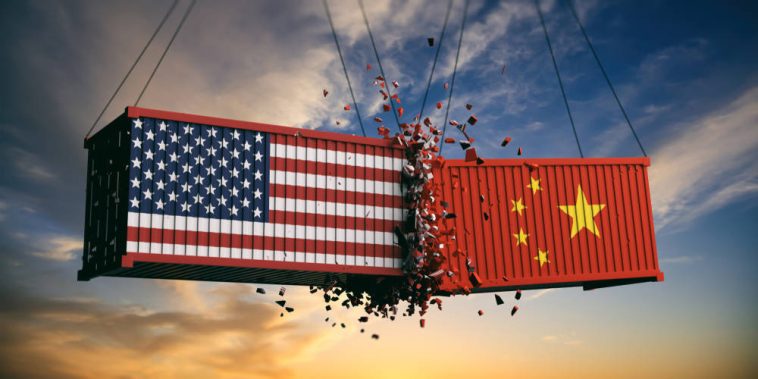The “chip wars” between the US and China show no sign of cooling off as Beijing prepares to examine whether America is unfairly subsidizing its own semiconductor companies. Meanwhile, Washington’s latest export restrictions have angered even some of its allies.
China’s government is to probe whether US subsidies to chipmakers are harming the Middle Kingdom’s own semiconductor companies and amount to unreasonable trade practices, in what could be seen as retaliation for the US administration’s litany of measures against the rival nation.
According to reports, the investigation will cover so-called mature node semiconductors, in which China has substantial capacity. These are commodity chips produced using older manufacturing processes rather than the cutting-edge technology for CPUs and GPUs, and typically target automotive, industrial, and consumer products.
China’s Commerce Ministry issued a statement saying it would examine whether the US is giving chip manufacturers an unfair advantage or allowing them to illegally undercut Chinese products, Reuters reported.
“The Biden administration has given a large amount of subsidies to the chip industry, and US enterprises have thus gained an unfair competitive advantage and exported relevant mature node chip products to China at low prices, which has undermined the legitimate rights and interests of China’s domestic industry,” the statement said.
Gaura Gupta, Gartner VP Analyst with the semiconductor and electronics team, told The Register:
“I just see this as a retaliation to [the] new set of export controls that the US is trying to impose on China. The US doesn’t really have a commanding presence in mature node foundries and enough capacity to export to China and that too at prices lower than what Chinese mature node foundries offer domestically to disturb their market.
“I would rather see this as a signal of what is to come – a clear separation of semiconductor ecosystem between the US/West and China – something we have been predicting for a while. This will create a major headache for chip companies and stifle innovation.”
Chinese chipmakers previously complained about the US CHIPS and Science Act, which has seen Washington dole out billions in subsidies or loans to bolster semiconductor manufacturing on American soil and advance research into future technologies.
It isn’t clear what kind of action may result from Beijing’s investigation, but US manufacturers that sell mature node chips to the Chinese market could potentially find their products hit by tariffs or even be blocked from importing them.
There is some irony here as China has itself been accused of dumping cheap chips onto the global market. Last year, the European Commission was concerned enough that it was sounding out chipmakers in the region about whether any action was needed.
US adds Chinese RISC-V player that TSMC suspected of helping build Huawei GPUs to risky company register
Nvidia snaps back at Biden’s ‘innovation-killing’ AI chip export restrictions
China gorging on silicon before Uncle Sam slams the door
China strikes back with Nvidia antitrust probe as US tightens tech chokehold
As The Register reported last year, China’s chip manufacturing capacity is expected to more than double between the next five to seven years as Beijing seeks to ramp up internal production to reduce reliance on imported silicon amid fears that this could lead to a global glut of mature node products.
The US started its own inquiry into whether China is engaged in dodgy trade practices regarding such chips (which it calls “foundational semiconductors”) just before Christmas, with the Office of the Trade Representative launching a Section 301 investigation.
“The People’s Republic of China (PRC) routinely engages in non-market policies and practices, as well as industrial targeting, of the semiconductor industry that enables PRC companies to significantly harm competition and create dangerous supply chain dependencies in foundational semiconductors,” a White House statement said.
It added that the Biden-Harris Administration would take action to “protect American workers and businesses from the PRC’s unfair trade practices.”
Last week the US introduced additional measures that attempt to control which countries can access advanced silicon produced by US companies, such as Nvidia’s GPU accelerators.
The move, however, has already angered some countries that found themselves on the wrong side of the list of trusted partners. European Union officials, for example, have asked the US to reconsider the policy, according to Politico, as access to these advanced chips will be capped for some EU nations, while others will face no restrictions.
The latter point might be futile, of course, as the single market means that goods can flow freely from one EU country to another. ®





GIPHY App Key not set. Please check settings